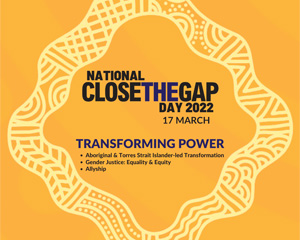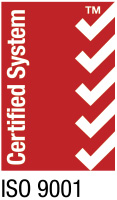In March each year, Australians from every corner of the country, in schools, businesses and community groups, show their support for the Close the Gap Campaign by marking National Close the Gap Day.
The Close the Gap (CTG) Campaign aims to close the health and life expectancy gap between Aboriginal and Torres Strait Islander peoples and non-Indigenous Australians within a generation. The campaign promotes a set of measurable targets to track and assess developments in the health and wellbeing of Aboriginal and Torres Strait Islander peoples.
This March, the team at Kalwun are reflecting on the progress we have made as an organisation to work towards these targets:
1. Everyone enjoys long and healthy lives
Every day, Kalwun works towards our vision that “Our people live long, healthy, prosperous and happy lives”. Our mission is that: through the provision of high quality, professional, culturally appropriate and respectful services to “Our People” (our Elders, patients, clients, consumers, staff and wider community) we will contribute to people living long, healthy, prosperous and happy lives.
Kalwun’s Community Care programs aim to assist older people and their carers with services including help at home and help getting out into the community. Services are designed to support eligible persons to remain living in their own homes in a way that promotes independence and reduces the risk of premature and/or inappropriate admission to residential aged care.
2. Children are born healthy and strong
Kalwun’s ‘Mums and Bubs’ program works to address some of the main contributors to low birth weights in babies including cigarette smoking during pregnancy, malnutrition and anaemia during pregnancy as well as limited antenatal care. Methods include:
- encouraging women to quit smoking with help from Kalwun’s Indigenous Health Workers and Deadly Choices team to provide culturally appropriate information, educational resources and free nicotine replacement therapies
- providing women with free pregnancy vitamins
- utilising Krurungal and other community-based support services, to assist families to gain access to groceries
- sharing culturally appropriate nutritional information about the importance of iron-rich foods during pregnancy.
Kalwun Mums and Bubs promotes women’s engagement in antenatal care by providing free antenatal health care at Kalwun health clinics or within their home and, if required, transport to their appointments, and a referral to the Waijungbah Jarjums Midwifery Group Practice based at Gold Coast Hospital.
3. Children are engaged in high quality, culturally appropriate early childhood education in their early years
Kalwun’s Early Learning Program is a one-of-a-kind intensive early childhood support service and a school readiness program aimed at 3 -5 year old jarjums. This program was featured in the ‘Closing the Gap’ Report 2017.
4. Children thrive in their early years
Kalwun’s Early Learning Program is free for the Aboriginal and Torres Strait Islander community and designed to meet the needs of the individual child. Staff work alongside families to identify any existing gaps and address them before starting school.
Kalwun also facilitates the Jarjums Playgroup which involves learning through play-based activities and encourages social and community connection for parents and young jarjums with a component of educational and cultural support.
5. Students achieve their full learning potential
Kalwun’s Health Service conducts yearly health checks at local schools to Kalwun clients 14 years and over. This ensures any development or social and emotional wellbeing issues are addressed to ensure the full potential for learning and health.
6. Students reach their full potential through further education pathways
Kalwun’s Youth Wellbeing Workers determine whether alternative education options would be beneficial for clients and add it as a goal for their action plan. The workers then source the most suitable options for their client. Recently, Kalwun clients have been successfully linked with the flexi-schools program, Arcadia College, Murri School and First Steps program.
7. Youth are engaged in employment or education
A priority of the Youth Wellbeing team at Kalwun is to keep our kids engaged in school where possible. However, this isn’t always the best option for the client. In some circumstances we explore alternative options such as alternative education programs such as flexi-schools or First Steps. We also work collaboratively with employment providers such as GenZ to link our youth in with employment training opportunities.
8. Strong economic participation and development of people and their communities
Our Family Wellbeing Workers, Youth Workers and Support workers have built strong partnerships with job actives, DATSIP and training centres to ensure our Aboriginal and Torres Strait islander community get the best support and opportunities in the workforce.
9. People can secure appropriate, affordable housing that is aligned with their priorities and need
Through the Affordable Housing Program, Kalwun is currently housing 50 Aboriginal and Torres Strait Islander families on the Gold Coast.
10. Adults are not overrepresented in the criminal justice system
Kalwun’s Domestic and Family Violence (DFV) program works with perpetrators with an aimed result of reducing the number of people that use violence in a domestic and family setting. This is hoped to have a positive effect on the overrepresentation of adults in the criminal justice system.
11. Young people are not overrepresented in the criminal justice system
Kalwun’s Youth Wellbeing Program aims to build on positive change, strengthen relationships with families and support networks as well as improve life skills and choices. We support young people through a combination of case management, mentoring and group activities. An early intervention/prevention approach is practiced with the aim to safeguard overrepresentation of young people in the youth justice system.
12. Children are not overrepresented in the child protection system
Kalwun’s Family Participation Program (FPP) is aimed at reducing the overrepresentation of Aboriginal and Torres Strait Islander children in out-of-home care by 45% by:
- supporting families with an underlying Aboriginal and Torres Strait Islander cultural framework to allow for them to have control of the process
- empowering families to have more of a voice in the process and play a more active role - while ensuring the families are clear of the worries and concerns
- Identifying (through family consent) other family and kin who can support the children and family to stay together, or to have the children temporarily placed with family or kin until the parents are able to take on the role of ongoing care for the child/ren
- linking families to supports and services
- supporting parents to deal with their personal issues like addictive behaviours, domestic violence, or past traumas — all of which may influence the quality of care they provide for their child/ren and to themselves.
13. Families and households are safe
Kalwun’s DFV program aims to achieve safety for Aboriginal and/or Torres Strait Islander households as they work towards a significant and sustained reduction of violence towards Aboriginal and/or Torres Strait Islander women and children.
This is achieved by providing a culturally-appropriate service and allowing time to build rapport with our families and/or individuals — creating a safe environment. We then establish a safety plan and surround clients with a safety net of family and support services. The program then works towards the healing process of families and/or individuals by creating a healing journey plan that is a collaborative design by client and worker.
The program is also working towards providing information and education around domestic and family violence and healthy relationships in the form of workshops. We aim to provide these workshops to not just adults but also young people.
14. People enjoy high levels of social and emotional wellbeing
Kalwun’s Social Health team delivers a program for Aboriginal and Torres Strait Islander people (as well as partners/parents/carers of an Aboriginal and/or Torres Strait Islander person) experiencing mental health illness and/or substance misuse disorders. The team provides case management and care coordination support and works to improve the social and emotional wellbeing of individuals.
Social and emotional wellbeing focuses on better connection of First Nations peoples' physical, mental and cultural needs to improve the overall sense of belonging. The Social Health team believe that people enjoy high levels of social and emotional wellbeing as it enables cultural safe practice and views First Nations people holistically when working within mental health and alcohol and other drug issues.
15. People maintain a distinctive cultural, spiritual, physical and economic relationship with their land and waters
At Kalwun we are proud of our strong connection to the Country we work on, which is embodied through our Aboriginal Cultural Centre, Jellurgal, which strives to preserve, promote and share Aboriginal culture. The team at the centre takes thousands of guests each year on a journey of discovery into local Aboriginal culture through our renowned Jellurgal tours. Our on-country immersion experiences at Jellurgal play an integral role towards forming and maintaining a strong connection to the land, waters, people and stories of the region we live and work on.
16. Cultures and languages are strong, supported and flourishing
Kalwun are committed to championing First Nation languages and cultures throughout our organisation and the community. We work and partner with our team and local community to promote traditional languages and cultures through:
- the host of events we hold each year
- the communications we develop
- the initiatives undertaken at Jellurgal, from our Jarjums Program to Aboriginal Dance Performances and Ceremonies and other bespoke cultural activities.
17. People have access to information and services enabling participation in informed decision-making regarding their own lives
All Kalwun services work to ensure that clients have understanding and control of their wellbeing. Kalwun’s Family Participation Program (FPP) aims to empower and support Aboriginal and Torres Strait Islander families to participate in child protection decision making. The program sees family in the broader sense and includes extended kin relationships and significant individuals from the child’s community.





